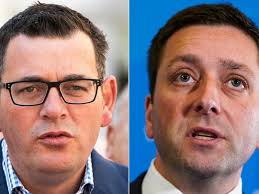Editorial
Written by: on
 What lessons can we draw from the Victorian state elections?
What lessons can we draw from the Victorian state elections?
The November state elections in Victoria saw the Daniel Andrews led ALP return to the government benches. The LNP Coalition under the leadership of Mathew Guy suffered a heavy defeat, losing a number of safe Liberal seats. A host of reasons for the swing against the Victorian Coalition have been advanced. One of the reasons suggested for the election loss is the recent shambolic performance of the dreadful Coalition government in Canberra. Supposedly, the Federal government was ‘unable to speak Victorian’, an affliction that developed after the deposing of Malcolm Turnbull back in August. That is, the Abbott, Turnbull, Morrison led Coalition governments effectively demonstrated to Victorians that the Coalition are far removed from ‘progressive’ values dear to the heart of many Victorians. The Coalition government and its Victorian equivalents’ political agendas, which included a fear-mongering and racist law and order campaign directed at African migrants, did not resonate with the majority of the Victorian electorate, hence the ‘unable to speak Victorian’ phrase. Richard Marles, the Victorian Federal ALP MP for the electorate of Corio, provided this rather nonsensical insight after the State election results became known.
The term progressive means different things to different people. For Marles and his ilk, progressive is shorthand for ALP policies. For other Australians progressive means more than small ‘l’ liberal policies and the building of major infrastructure projects, important though these things may be. Rather, there is a class basis to progressive policies. That is, progressive policies should reflect the views of and benefit the majority of the working population. Such policies should be based on what benefits the working class as opposed to what benefits multinational corporations, finance capital and imperialism. Progressive policies should have as a key part of their foundation an independent working class agenda, an agenda that strives to build socialism in an independent Australia. Limiting the term progressive to small ‘l’ liberal issues/campaigns, allied with an acceptance of the constraints of capitalism and the piece-meal reformism of parliamentarism is not only a mistake it devalues the term.
One point from the election worthy of comment and analysis is the campaign of the Victorian Socialists. A coming together of various progressive individuals and socialist organisations, notably Socialist Alliance and Socialist Alternative, the party was formed in an attempt to get lead candidate Steve Jolly elected in the Upper House seat of the Northern Metropolitan Region in Melbourne. As a part of its campaign, the Victorian Socialists also stood a number of candidates in various electorates across the state.
Part of the rationale advanced by those associated with the Victorian Socialists is that their electoral campaigning brings attention to socialism and provides a proper progressive alternative to the usual bourgeois parties. In addition, they are trying to provide a left-wing alternative to the many right-wing micro parties, the latter attracting the protest vote of the growing number of people completely disillusioned with the parliamentary system. In some of their election material, the Victorian Socialists did put forward policies that were focussed on and would be beneficial to working class people. For that they deserve credit. Whether the Victorian Socialists’ campaign can be deemed a ‘success’ is debatable. Although failing to get any of their candidates elected, both the Socialist Alliance and the Socialist Alternative, the key players in the Victorian Socialists group, were pleased with how they polled and have been quick to deem the attempt a success. The Victorian Socialists now appear likely to put up candidates in future federal and local council elections. This indicates a concerning trend that threatens to concentrate the energy and attention of hundreds of hard working socialists and activists into the false hope of electoral politics and reformism. Moreover it channels the growing disillusionment of working class people with parliamentary politics back into the very institutions which do not serve their class interests.
For our part, the lessons to be learnt from the November state elections are the following: First, the success of the ALP’s election campaign, backed by the mobilisations of the unions and their members, did represent at some level, resistance to the Federal Coalition’s anti-working class and pro-big business positions. Second, the Victorian Socialists are not to be condemned for attempting to push forward socialist ideas and working class policies. Third and most importantly, we should never lose sight of the fact that bourgeois parliamentarism exists to serve bourgeois class interests; a revolutionary party should never make parliamentary politics and parliamentarism the cornerstone of their political work. To do so risks turning into a party of bourgeois reformism no matter how ‘progressive’ its policies may be. Major reforms and concessions can be won outside of parliament if the working class dares to struggle – we only need to look at France right now for an example of that!
Print Version - new window Email article
-----
Go back
 What lessons can we draw from the Victorian state elections?
What lessons can we draw from the Victorian state elections?